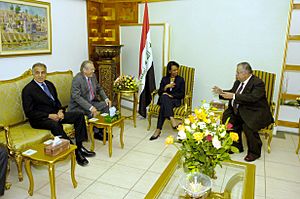Zalmay Khalilzad facts for kids
Quick facts for kids
Zalmay Khalilzad
|
|
|---|---|
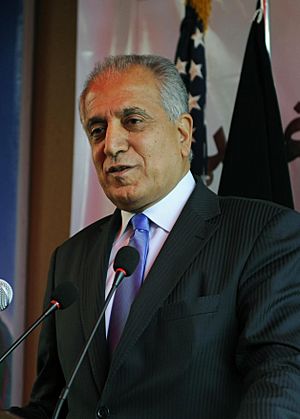
Khalilzad in 2011
|
|
| U.S. Special Representative for Afghanistan Reconciliation | |
| In office September 21, 2018 – October 19, 2021 |
|
| President | Donald Trump Joe Biden |
| Preceded by | Position established |
| Succeeded by | Thomas West |
| 26th United States Ambassador to the United Nations | |
| In office April 30, 2007 – January 22, 2009 |
|
| President | George W. Bush Barack Obama |
| Preceded by | John Bolton |
| Succeeded by | Susan Rice |
| United States Ambassador to Iraq | |
| In office June 21, 2005 – March 26, 2007 |
|
| President | George W. Bush |
| Preceded by | John Negroponte |
| Succeeded by | Ryan Crocker |
| 15th United States Ambassador to Afghanistan | |
| In office September 2, 2004 – June 20, 2005 |
|
| President | George W. Bush |
| Preceded by | Robert Finn |
| Succeeded by | Ronald E. Neumann |
| Personal details | |
| Born |
Zalmay Mamozy Khalilzad
March 22, 1951 Mazar-i-Sharif, Kingdom of Afghanistan |
| Spouse | Cheryl Benard |
| Children | 2 |
| Education | American University of Beirut (BA, MA) University of Chicago (PhD) |
Zalmay Mamozy Khalilzad (born March 22, 1951) is an American diplomat and expert in foreign policy. He is known for his important roles in the United States government.
From September 2018 to October 2021, Khalilzad served as the U.S. Special Representative for Afghanistan Reconciliation. This means he worked to help bring peace to Afghanistan.
Before that, President George W. Bush appointed him as the United States Ambassador to the United Nations. He held this position from 2007 to 2009. At that time, he was the highest-ranking Muslim-American in the U.S. government.
He also served as the U.S. ambassador to Afghanistan from 2004 to 2005 and as ambassador to Iraq from 2005 to 2007.
Khalilzad grew up in Kabul, the capital of Afghanistan. He first came to the United States as a high school exchange student. Later, he earned his doctorate degree from the University of Chicago. During the Reagan Administration, he worked for the U.S. Department of State. There, he advised on how the U.S. should respond to the Soviet–Afghan War.
In 2017, President Donald Trump considered him for the role of Secretary of State. On September 5, 2018, Trump appointed Khalilzad as the special representative for Afghanistan reconciliation. He continued in this role under President Joe Biden until October 18, 2021. In this job, Khalilzad helped create the US–Taliban deal. This agreement helped with the final withdrawal of U.S. troops from Afghanistan.
Contents
Early Life and Education
Zalmay Khalilzad was born in Mazar-i-Sharif, Afghanistan. His parents were from the Laghman Province. He grew up in Kabul, the country's capital. He is from the Pashtun ethnic group, specifically the Noorzai tribe. He started his schooling at Ghazi Lycée, a public school in Kabul.
Khalilzad first visited the United States as a high school exchange student. He was part of the AFS Intercultural Programs in Ceres, California. He later earned his bachelor's and master's degrees from the American University of Beirut in Lebanon.
He received his doctorate from the University of Chicago. There, he studied with Albert Wohlstetter, an important thinker on nuclear strategy. Wohlstetter helped Khalilzad connect with people in the government and at RAND Corporation. Khalilzad has written many papers for the RAND Corporation.
Early Career in Government
From 1979 to 1989, Khalilzad was a professor of Political Science at Columbia University. During this time, he worked with Zbigniew Brzezinski. Brzezinski was involved in Operation Cyclone, which supported Afghan fighters against the Soviet Union's invasion of Afghanistan.
In 1984, Khalilzad joined the US State Department for a year. He advised the Near East and South Asia Bureau.
From 1985 to 1989, he worked in the Reagan administration. He was a senior State Department official and advised on the Soviet–Afghan War. He helped guide an international program to support a government led by Afghan fighters against the Soviet occupation. From 1990 to 1992, he worked for President George H. W. Bush in the Defense Department.
Between 1993 and 2000, Khalilzad directed strategy at the RAND Corporation. He helped create RAND's Center for Middle Eastern Studies. He also wrote important books about U.S. global leadership.
Supporting U.S. Global Leadership
Khalilzad wrote articles in the mid-1990s about the importance of the U.S. being a global leader. He believed that if American power declined, it could lead to global instability.
In 1998, Khalilzad signed a letter to President Bill Clinton. The letter asked Clinton to help remove Saddam Hussein from power in Iraq. It suggested using diplomatic, political, and military efforts.
Views and Beliefs
American Politics
Khalilzad has been called a "lifelong Republican". However, he did not support Donald Trump's presidential campaign in 2016.
United States' Role in the World
Some people have described Khalilzad as a neoconservative. This term refers to someone who believes in using American power to promote democracy and American interests around the world. In 2006, he even wrote an article called "The Neoconservative Case for Negotiating With Iran."
In 1995, Khalilzad shared his ideas about the U.S. role after the Cold War. He believed the U.S. should be ready to use force if needed. He said that East Asia, Europe, and the Persian Gulf (because of its oil) were very important regions.
He also argued that the U.S. military should be strong enough to handle "two major regional conflicts almost at the same time." This meant being able to fight in places like Korea and the Persian Gulf at once.
Afghanistan
Taliban
In June 2001, Khalilzad said the U.S. needed to act to weaken the Taliban and stop their influence. He suggested several ways to do this:
- Help groups that opposed the Taliban.
- Speak out against the Taliban's ideas, using media like the Voice of America.
- Pressure Pakistan to stop supporting the Taliban.
- Help people affected by the Taliban.
- Support moderate Afghans by helping them form a new government.
- Make Afghanistan a more important issue for the U.S.
Peace Process in Afghanistan
In June 2009, Khalilzad spoke about the peace process in Afghanistan. He told President Hamid Karzai that peace was necessary, but conditions had to be right. He advised Karzai to fix problems like corruption and improve government services. Khalilzad believed that if people saw a better government, they would support it. If not, they might become neutral or even support the other side if it offered more security.
North Korea
In a 1993 paper, Khalilzad suggested "trade sanctions" against North Korea. He also mentioned "enhancing U.S. and South Korean military readiness" and "direct military attacks." He believed that using force could help achieve U.S. goals, but he noted the risk of starting another Korean war.
George W. Bush Administration (2001-2009)
U.S. Ambassador to Afghanistan
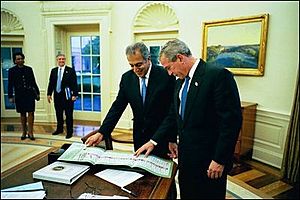
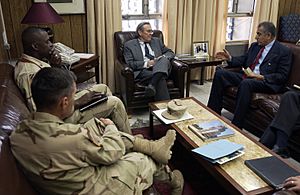
In 2001, President George W. Bush asked Khalilzad to lead his team for the Department of Defense. Khalilzad also served as an advisor to Secretary of Defense Donald Rumsfeld. In May 2001, he was appointed as a special assistant to the president for Southwest Asia, Near East, and North African affairs. In December 2002, Bush appointed him to coordinate plans for Iraq after Saddam Hussein.
After the September 11 attacks, Bush relied on Khalilzad's knowledge of Afghanistan. Khalilzad helped plan to overthrow the Taliban. On December 31, 2001, he became Bush's special envoy for Afghanistan. He held this role until November 2003, when he became the U.S. ambassador to Afghanistan. He served as ambassador until June 2005.
During his time as ambassador, he helped write the constitution of Afghanistan. He was also involved in the country's first elections. He helped organize the first meeting of Afghanistan's Loya Jirga (a traditional grand assembly). In 2004 and 2005, he helped establish the American University of Afghanistan (AUAF). This was the first American-style university in Afghanistan.
U.S. Ambassador to Iraq
Khalilzad started his job as the U.S. ambassador to Iraq on June 21, 2005. He was praised for helping to negotiate agreements that led to the approval of the Constitution of Iraq in October 2005. He also worked to make sure the December 2005 elections went smoothly. He played a big part in forming Iraq's first government after Saddam Hussein. Khalilzad also helped create the American University of Iraq in Sulaimaniya.
Compared to previous ambassadors, Khalilzad was seen as successful. He was credited with understanding Iraqi culture and connecting with Iraqis.
Khalilzad was one of the first officials to warn that violence between different groups was becoming a bigger threat than the insurgency in Iraq. After a mosque bombing in February 2006, he warned that spreading violence could lead to civil war. He worked to find political solutions to the problem of different groups fighting.
His term as ambassador ended on March 26, 2007.
U.S. Ambassador to the United Nations
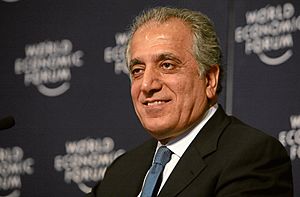
On February 12, 2007, the White House nominated Khalilzad to become the U.S. ambassador to the United Nations. The US Senate approved his nomination unanimously on March 29, 2007. This was different from his predecessor, John R. Bolton, who faced more challenges getting approved.
His colleagues at the UN noted that Khalilzad had a different, more cooperative style than Bolton.
In November 2007, Khalilzad claimed that Iran was helping insurgent groups in Afghanistan and Iraq. He also stated that Iran was continuing its nuclear program. Khalilzad explained that the U.S. would try to pass another resolution in the Security Council to add more sanctions against Iran.
In August 2008, he urged the Security Council to act quickly and condemn Russia's military attack on Georgia.
Private Sector (2009–2018)
From 2009 to 2018, Khalilzad was the president of Khalilzad Associates, LLC. This company advised clients on business and public policies, especially in challenging international markets like Iraq and Afghanistan. His company worked with businesses in energy, construction, education, and infrastructure.
Khalilzad also served as a counselor at the Center for Strategic International Studies (CSIS). He was on the boards of several organizations, including the National Endowment for Democracy (NED) and the Atlantic Council.
In 2014, news reports in Austria mentioned that Khalilzad was being investigated for suspected money laundering. However, the Austrian court dismissed the case and unfroze the accounts a week later.
In 2015, he donated over $100,000 to the Atlantic Council, a U.S. research organization.
Khalilzad's autobiography, The Envoy: From Kabul to the White House, My Journey Through a Turbulent World, was published in 2016.
Envoy for Afghan Reconciliation
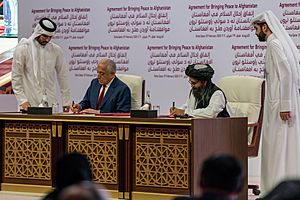
In September 2018, Secretary of State Mike Pompeo named Khalilzad as the Special Representative for Afghanistan Reconciliation. This new role focused on finding a peaceful solution to the conflict in Afghanistan. He continued in this role under President Joe Biden.
On May 18, 2021, Khalilzad spoke at a U.S. House of Representatives hearing. He suggested that the Taliban would not quickly take over Afghanistan after U.S. forces left. He believed that Afghan security forces and other Afghans would fight, leading to a long war. He also said that the idea of Afghan forces falling apart quickly was mistaken. However, the 2021 Taliban offensive led to a swift Taliban takeover and the collapse of the Afghan National Army.
In 2022, Politico reported that Khalilzad attended a dinner with the Russian ambassador to the United States, Anatoly Antonov. During the dinner, Khalilzad reportedly said that "we need an agreement" to end the war in Ukraine.
Awards and Recognition
Khalilzad's work in government has been recognized by three different Secretaries of Defense.
- Robert Gates gave him the Department of Defense medal for outstanding public service for his work in Iraq.
- Donald Rumsfeld awarded him the same medal for his work in Afghanistan.
- Dick Cheney also gave him the medal for his time as assistant deputy undersecretary of defense from 1991 to 1992.
He has also received the highest national medals from the presidents of Afghanistan, Georgia, and Kosovo. In Afghanistan, he received the King Amanullah Medal in 2005. The Georgian president awarded him the Order of the Golden Fleece in 2016. Kosovo's president gave him the Order of Independence in 2017.
Personal Life
Zalmay Khalilzad is an ethnic Pashtun. His wife is author and political analyst Cheryl Benard. They met in 1972 while they were students at the American University of Beirut. They have two children.
See also
 In Spanish: Zalmay Khalilzad para niños
In Spanish: Zalmay Khalilzad para niños
 | Selma Burke |
 | Pauline Powell Burns |
 | Frederick J. Brown |
 | Robert Blackburn |


